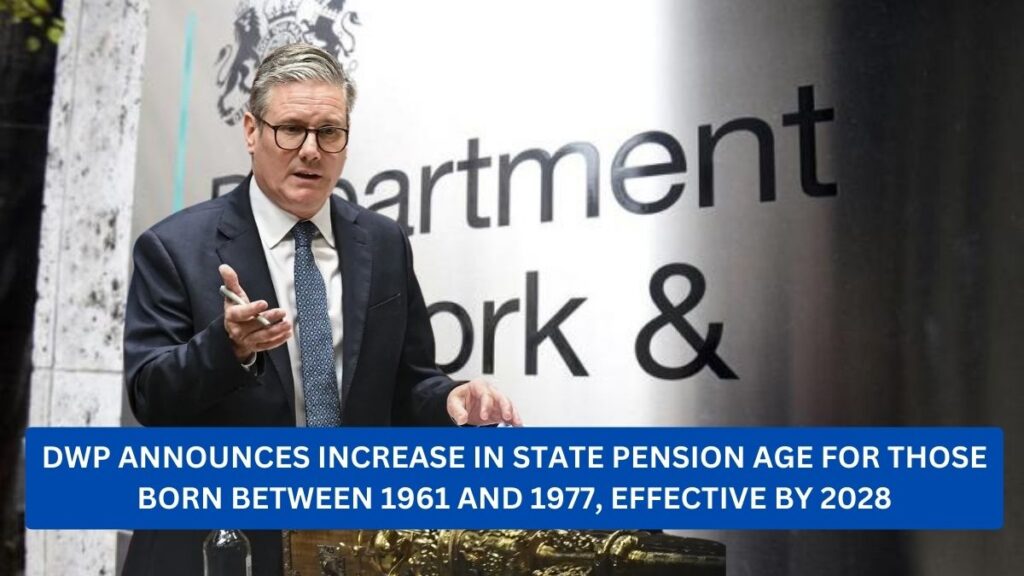In a significant change that will affect millions, the UK Government and the Department for Work and Pensions (DWP) have confirmed that the State Pension age will rise to 67 for individuals born between March 6, 1961, and April 5, 1977. This shift is part of a broader effort to keep the State Pension system sustainable in light of the UK’s aging population and increased life expectancy.
When Will the Change Take Effect?
The increase is already underway and is expected to be fully implemented by 2028. Those born in this bracket will no longer be eligible for the State Pension at age 66 as previously expected but will need to wait until they turn 67.
This transition follows a gradual schedule, giving individuals enough time to adjust their retirement plans. For example:
- Those born between March 6, 1961, and April 5, 1977 will have a State Pension age of 67
- Those born after April 5, 1977, may see the pension age eventually rise to 68 or beyond, with the exact timeline subject to future review
You can check your personal State Pension age using the official UK government tool here: https://www.gov.uk/state-pension-age

Why Is the Pension Age Rising?
The rising pension age is not new but part of a longer-term reform aimed at keeping the pension system financially viable. According to the UK Government’s Office for National Statistics (ONS), life expectancy has been steadily increasing over the decades, placing greater financial pressure on the public pension system.
The government has stated that these changes are necessary to balance fairness between generations and to respond to demographic and economic trends.
Read the Government’s pension age review here: https://www.gov.uk/government/publications/state-pension-age-review-2023
Who Will Be Affected?
If you were born between March 6, 1961, and April 5, 1977, and are currently aged between 48 and 64, this change affects when you can start receiving your State Pension.
If you had originally planned your retirement around age 66, you may now need to adjust your savings strategy or work plans accordingly.
How Much Is the State Pension?
The new State Pension (for those reaching pension age after April 6, 2016) is currently:
- £203.85 per week (as of the 2024/2025 financial year), amounting to £10,600.20 annually
(Source: UK Gov State Pension Rates)
To qualify for the full new State Pension, you must have 35 qualifying years of National Insurance contributions. If you have fewer years, you’ll receive a proportionate amount.
What About the Increase to Age 68?
The DWP has also reviewed plans to bring forward the rise in State Pension age to 68, which could affect people born after April 5, 1977. Although the proposed acceleration has not yet been confirmed, it remains under consideration.
Keep an eye on announcements via the official DWP site: https://www.gov.uk/government/organisations/department-for-work-pensions
Planning Your Retirement
If you’re in the affected age group, it’s more important than ever to review your pension savings, workplace pension schemes, and any private pension plans you have in place.
- Use the UK’s State Pension forecast tool to check what you’re on track to receive: https://www.gov.uk/check-state-pension
- Consider speaking to a financial adviser to adjust your retirement plans if needed.

Political and Public Response
The decision to increase the State Pension age has drawn mixed reactions. While some experts agree it reflects demographic realities, others express concern over the impact on manual workers and those in lower-income brackets who may not be able to work longer.
In response, the government has said it will review the policy periodically to account for changing health and economic factors.
Final Thoughts
As millions of Britons inch closer to retirement, it’s essential to stay updated on State Pension age changes. While the delay to age 67 may seem modest, it could significantly impact your retirement timeline, finances, and life plans.
For official guidance and the latest updates, visit:
This article has been carefully fact-checked by our editorial team to ensure accuracy and eliminate any misleading information. We are committed to maintaining the highest standards of integrity in our content.



